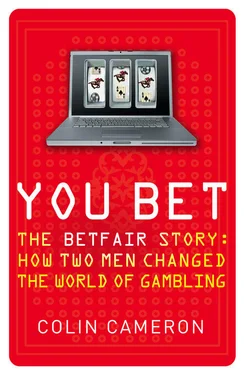Walk into the second-floor reception of Betfair’s Hammersmith offices and, as well as chairs that look suspiciously like they have been removed from the Big Brother diary room, there is a window into an office space. Above this window are the words ‘Global Network Operations Centre’. Through the window you can see a wall of screens, clocks telling you the time in London, New York, Johannesburg, Hong Kong, and Sydney. Central is a television screen showing whatever sport at the time happens to be the most significant in the world, from a betting perspective.
Behind two long desks which cover nearly the width of the room and face the screens are casually dressed staff who seem the essence of calm. That is despite their principal job being to monitor the smooth running of the systems and online status of accounts held by clients who in Betfair’s years of business have emerged as the biggest fish in Betfair’s sea. When the screens show green, all is well. When they become coloured in orange, there is a problem, which the team methodically resolves seemingly without breaking sweat.
Going back to 2003, the scene in London’s Old Whitbread Brewery, off Chiswell Street, was, in contrast, altogether more testosterone-fuelled and thick with perspiration. Up to this point, I had only a vague awareness of Betfair. Having accepted a commission from Esquire magazine to write about the growing popularity of betting exchanges, I also accepted, along with around eighty others similarly uninitiated, an invitation from Betfair to road-test the concept.
That night, a fag-end Champions’ League group game between Chelsea – already certain to qualify for that season’s knockout stages – and Sparta Prague was transformed into an epic encounter taking those present on an experience which will have changed many of their gambling habits, if not their whole social lives, permanently. What’s more the game was 0-0. Still, there was an intensity in the room. It was then illegal to trade or bet in real money at such a gathering. Instead, each table had an imaginary stake to invest and computers set up for gambling at high speed. Halfway through an otherwise drab goal-less draw in front of a largely lifeless, under-capacity crowd, you might have thought someone would actually be walking out with a real pot of gold, such was the intensity of trading and feeling contained in the room. An IT engineer on hand to fix any screens mid-match received an ear-bashing from one guest for the rate at which his computer was rebooting. From this reaction, you might have imagined that life-changing money rather than a Monopoly version was on the table.
Something was obviously afoot. And yet, some of betting’s shrewdest thinkers – Stuart Wheeler, who set up and ultimately floated the spread betting firm, IG Index; John Brown, who worked up from the shop floor to the chief executive’s desk and chairman’s office at William Hill; and the Tote chairman, Peter Jones – considered betting exchanges to be short-term, or with a minimal future ahead. The consensus at the start of the millennium? Betting exchanges generally were considered no more than niche potential. Betfair was underestimated on two fronts; as an example of a new concept in an industry full of potential for innovation, and as the company that would become the completely dominant market force in what quickly became substantively more than simply a ‘niche’.
Hindsight is, of course, a wonderful thing. No one who bets needs to be told that. Nonetheless, there was enough evidence in the many theories of why we bet, or are drawn to gambling, to suggest that person-to-person betting might indeed catch on with those already entrenched in the habit-forming world of gambling. Then there are those with a predisposition for what Betfair was offering – of a certain age and affluence, comfortable with technology and in circumstances that meant speculation was harmless. They may have begun the new millennium with little interest in high street outlets offering a product that had changed little, if at all, in forty years since betting shops were legalised. Yet, when offered the chance to try their luck through a different medium, drawn to something new and contemporary, they joined die-hard gamblers to ensure the success of Betfair.
The numbers tell the basic story. For the newly-born Betfair, revenue in 2001 was £480,000, profitability in the negative to the tune of almost £2 million. The first part of this book explains how technology that drew on the IT system of New York’s Stock Exchange and brilliant marketing – on relative shoestring budgets – established a company that was robust enough to absorb these early losses and Flutter, seemingly the only genuine rival in this newly-created market. In the space of under three years Betfair registered revenue figures topping £32 million and a profit of £1.76 million, carrying the company into the black where it has firmly remained. Then in part two of this book, we consider the reach of Betfair beyond its own dedicated world. How the company has been both part of the growth in betting and the revolution that gambling – from basic bookmaking to high-ranking casinos – has undergone, and the reason for changes in what was for decades a business which showed little or no appetite for change. Also considered is how Betfair has changed government thinking on betting, how Betfair has been cause for sport to reassess its ‘at arm’s length’ relationship with betting and how Betfair has proved an inspiration to other start-ups and the potential that exists for growth both domestically and internationally.
How did this all come to pass? Spread betting, the innovation in gambling of the 1990s, never managed to establish a foothold the like of which Betfair can boast today or induce wholesale changes to the betting and gambling industries both in Britain and beyond. How then did the world of sport, historically suspicious of betting, end up working together with a betting company? What compelled the International Olympic Committee to set up a network in Beijing for the 2008 Games with a brief to monitor betting on events over the two weeks of sport? For the answers to that and the rest, first, we have to go back to the start of the new millennium.
Конец ознакомительного фрагмента.
Текст предоставлен ООО «ЛитРес».
Прочитайте эту книгу целиком, купив полную легальную версию на ЛитРес.
Безопасно оплатить книгу можно банковской картой Visa, MasterCard, Maestro, со счета мобильного телефона, с платежного терминала, в салоне МТС или Связной, через PayPal, WebMoney, Яндекс.Деньги, QIWI Кошелек, бонусными картами или другим удобным Вам способом.











